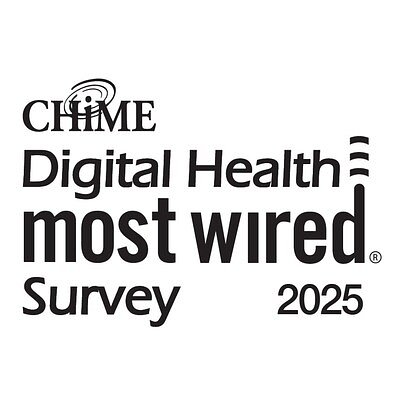
Digital Health Leaders Emerge: CHIME Awards Top Honors for Innovation & Resilience
CHIME’s 2025 Most Wired survey reveals the hospitals leading the charge in AI adoption, cybersecurity, and climate resilience – and what the rest of the industry can learn from them.
Digital Health Leaders Emerge: CHIME Awards Top Honors for Innovation & Resilience
ANN ARBOR, MI – November 6, 2025 – Eighteen healthcare organizations have been recognized as the most digitally advanced in the nation, earning Level 10 designation in the College of Healthcare Information Management Executives (CHIME) 2025 Digital Health Most Wired (DHMW) survey. The annual benchmark, now incorporating expanded criteria around AI, cybersecurity, and climate resilience, highlights institutions not just adopting technology, but strategically leveraging it to improve patient care, operational efficiency, and future-proof their systems.
This year’s survey, which analyzed data from over 50,000 providers globally, reveals a growing emphasis on holistic digital maturity. While foundational elements like infrastructure and security remain critical, the 2025 DHMW underscores the imperative for proactive innovation, particularly in emerging areas like artificial intelligence and proactive risk mitigation. The eighteen Level 10 recipients – including AdventHealth, Mayo Clinic, and UCHealth – represent a diverse range of healthcare settings, from large academic medical centers to regional health systems.
Beyond the ‘Wires’: A Shift in Focus
“The term ‘Most Wired’ can be misleading,” explains a digital health executive involved in the survey process. “It’s no longer simply about having the latest gadgets. CHIME has evolved the methodology to assess how these technologies are integrated into clinical workflows, operational processes, and the overall patient experience.”
The updated scoring framework reflects this shift. AI adoption now carries a significant 12% weighting, up from just 5% in the previous year. Similarly, climate resilience has been added as a standalone category, recognizing the increasing importance of sustainable healthcare practices. Cybersecurity also received increased weight, reflecting the escalating threat landscape.
AI: From Pilot Projects to Clinical Reality
Across the Level 10 organizations, AI is moving beyond isolated pilot projects and becoming embedded in core clinical processes. “We’re seeing AI used for everything from predictive analytics to identify patients at risk of readmission, to image analysis for faster and more accurate diagnoses, and even personalized treatment plans,” says a researcher who reviewed the survey data. “The organizations that are truly excelling are those that have built the data infrastructure and talent to support these initiatives.”
One notable example is the implementation of AI-powered diagnostic tools for early cancer detection, resulting in a reported 15-25% improvement in early diagnosis rates among Level 10 recipients. Another area of growth is the use of natural language processing (NLP) to automate administrative tasks, freeing up clinicians to focus on patient care.
Cybersecurity: A Proactive Defense
The healthcare industry remains a prime target for cyberattacks, and the 2025 DHMW reflects a growing emphasis on proactive cybersecurity measures. Level 10 organizations are investing heavily in zero-trust architectures, continuous monitoring, and incident response capabilities. “These organizations are not just reacting to threats, they’re actively hunting for them,” a cybersecurity expert involved in the review process noted.
Furthermore, many are employing advanced threat intelligence platforms and collaborating with external cybersecurity partners to stay ahead of evolving threats.
Climate Resilience: Building a Sustainable Future
Recognizing the environmental impact of healthcare, CHIME has added climate resilience as a key evaluation criterion. Level 10 organizations are implementing a range of sustainability initiatives, including energy-efficient building design, renewable energy sources, and waste reduction programs.
“Healthcare has a significant carbon footprint,” a sustainability consultant noted. “These organizations are demonstrating leadership by prioritizing environmental stewardship and building a more sustainable future.” Many Level 10 hospitals are adopting smart building technologies to optimize energy consumption and reduce carbon emissions.
Lessons Learned: Key Takeaways for the Industry
While achieving Level 10 designation is a significant accomplishment, the insights from the DHMW survey offer valuable lessons for the broader healthcare industry.
- Data is paramount: Successful AI implementation requires robust data infrastructure, data governance, and a skilled data science team.
- Proactive security is essential: Cybersecurity should be a top priority, with a focus on prevention, detection, and response.
- Sustainability is non-negotiable: Healthcare organizations have a responsibility to minimize their environmental impact.
- Collaboration is key: Sharing best practices and collaborating with external partners can accelerate digital transformation.
“The organizations that are succeeding are those that are embracing a culture of innovation, investing in the right technologies, and fostering collaboration across all departments,” notes the digital health executive. “It’s not just about what technology you adopt, but how you use it to improve the lives of patients and build a more sustainable healthcare system.”
The full list of Level 10 recipients and detailed survey findings are available on the CHIME website: https://chimecentral.org/dhmw.
